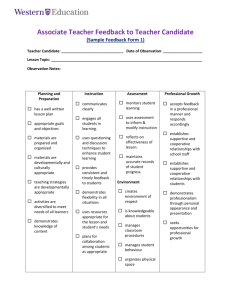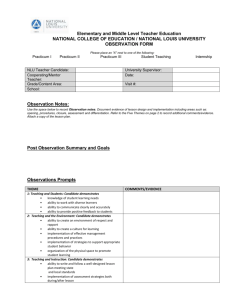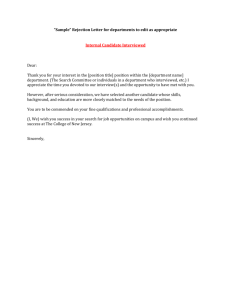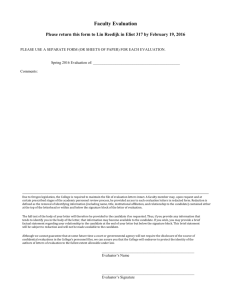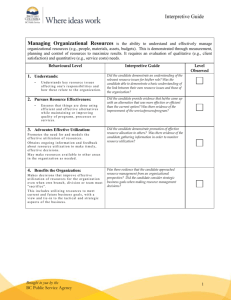CONTENT AREAS ASSESSMENT
advertisement
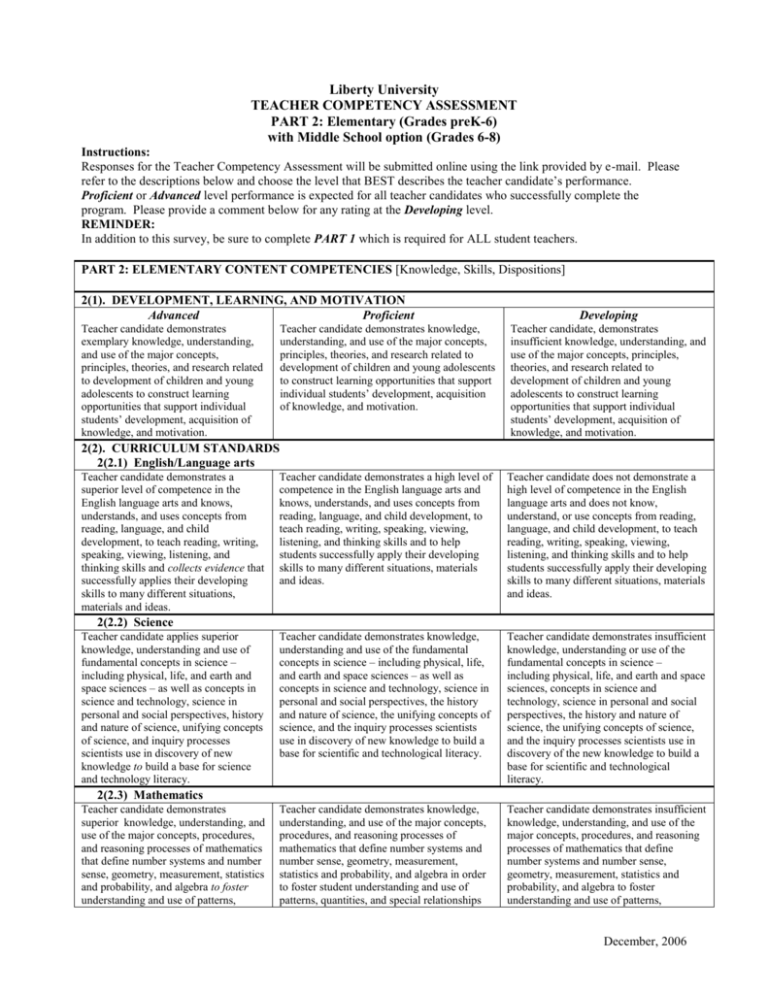
Liberty University TEACHER COMPETENCY ASSESSMENT PART 2: Elementary (Grades preK-6) with Middle School option (Grades 6-8) Instructions: Responses for the Teacher Competency Assessment will be submitted online using the link provided by e-mail. Please refer to the descriptions below and choose the level that BEST describes the teacher candidate’s performance. Proficient or Advanced level performance is expected for all teacher candidates who successfully complete the program. Please provide a comment below for any rating at the Developing level. REMINDER: In addition to this survey, be sure to complete PART 1 which is required for ALL student teachers. PART 2: ELEMENTARY CONTENT COMPETENCIES [Knowledge, Skills, Dispositions] 2(1). DEVELOPMENT, LEARNING, AND MOTIVATION Advanced Proficient Teacher candidate demonstrates exemplary knowledge, understanding, and use of the major concepts, principles, theories, and research related to development of children and young adolescents to construct learning opportunities that support individual students’ development, acquisition of knowledge, and motivation. Developing Teacher candidate demonstrates knowledge, understanding, and use of the major concepts, principles, theories, and research related to development of children and young adolescents to construct learning opportunities that support individual students’ development, acquisition of knowledge, and motivation. Teacher candidate, demonstrates insufficient knowledge, understanding, and use of the major concepts, principles, theories, and research related to development of children and young adolescents to construct learning opportunities that support individual students’ development, acquisition of knowledge, and motivation. Teacher candidate demonstrates a high level of competence in the English language arts and knows, understands, and uses concepts from reading, language, and child development, to teach reading, writing, speaking, viewing, listening, and thinking skills and to help students successfully apply their developing skills to many different situations, materials and ideas. Teacher candidate does not demonstrate a high level of competence in the English language arts and does not know, understand, or use concepts from reading, language, and child development, to teach reading, writing, speaking, viewing, listening, and thinking skills and to help students successfully apply their developing skills to many different situations, materials and ideas. Teacher candidate demonstrates knowledge, understanding and use of the fundamental concepts in science – including physical, life, and earth and space sciences – as well as concepts in science and technology, science in personal and social perspectives, the history and nature of science, the unifying concepts of science, and the inquiry processes scientists use in discovery of new knowledge to build a base for scientific and technological literacy. Teacher candidate demonstrates insufficient knowledge, understanding or use of the fundamental concepts in science – including physical, life, and earth and space sciences, concepts in science and technology, science in personal and social perspectives, the history and nature of science, the unifying concepts of science, and the inquiry processes scientists use in discovery of the new knowledge to build a base for scientific and technological literacy. Teacher candidate demonstrates knowledge, understanding, and use of the major concepts, procedures, and reasoning processes of mathematics that define number systems and number sense, geometry, measurement, statistics and probability, and algebra in order to foster student understanding and use of patterns, quantities, and special relationships Teacher candidate demonstrates insufficient knowledge, understanding, and use of the major concepts, procedures, and reasoning processes of mathematics that define number systems and number sense, geometry, measurement, statistics and probability, and algebra to foster understanding and use of patterns, 2(2). CURRICULUM STANDARDS 2(2.1) English/Language arts Teacher candidate demonstrates a superior level of competence in the English language arts and knows, understands, and uses concepts from reading, language, and child development, to teach reading, writing, speaking, viewing, listening, and thinking skills and collects evidence that successfully applies their developing skills to many different situations, materials and ideas. 2(2.2) Science Teacher candidate applies superior knowledge, understanding and use of fundamental concepts in science – including physical, life, and earth and space sciences – as well as concepts in science and technology, science in personal and social perspectives, history and nature of science, unifying concepts of science, and inquiry processes scientists use in discovery of new knowledge to build a base for science and technology literacy. 2(2.3) Mathematics Teacher candidate demonstrates superior knowledge, understanding, and use of the major concepts, procedures, and reasoning processes of mathematics that define number systems and number sense, geometry, measurement, statistics and probability, and algebra to foster understanding and use of patterns, December, 2006 quantities, and special relationships that can represent phenomena, solve problems, and manage data. that can represent phenomena, solve problems, and manage data. quantities, and special relationships that can represent phenomena, solve problems, and manage data. Teacher candidate demonstrates knowledge, understanding, and use of the major concepts and modes of inquiry from the social studies – the integrated study of history, geography, the social sciences, and other related areas – to promote elementary students’ abilities to make informed decisions as citizens of a culturally diverse democratic society and interdependent world. Teacher candidate does not demonstrate knowledge, understanding, and use of the major concepts and modes of inquiry from the social studies – the integrated study of history, geography, the social sciences, and other related areas – to promote elementary students’ abilities to make informed decisions as citizens of a culturally diverse democratic society and interdependent world. 2(2.4) Social studies Teacher candidate demonstrates superior knowledge, understanding, and use of the major concepts and modes of inquiry from the social studies – the integrated study of history, geography, the social sciences, and other related areas – to develop student’s abilities to make informed decisions as citizens of a culturally diverse democratic society and interdependent world. 2(2.5) The arts Advanced Teacher candidate demonstrates superior knowledge, understanding, and use of the content, functions, and achievements of dance, music, theater, and the several visual arts as primary media for communication, inquiry, and insight among elementary students. Proficient Developing Teacher candidate demonstrates knowledge, understanding, and use of the content, functions, and achievements of dance, music, theater, and the several visual arts as primary media for communication, inquiry, and insight as appropriate to elementary students. Teacher candidate demonstrates insufficient knowledge, understanding, or use of the content, functions, and achievements of dance, music, theater, and the several visual arts as primary media for communication, inquiry, and insight among elementary students. Teacher candidate demonstrates knowledge, understanding, and use of the major concepts in the subject matter of health education to create opportunities for student development and practice of skills that contribute to good health. Teacher candidate does not demonstrate knowledge, understanding, or use of the major concepts in the subject matter of health education to create opportunities for student development and practice of skills that contribute to good health. Teacher candidate demonstrates knowledge, understanding, and use of human movement and physical activity as central elements to foster active, healthy life styles and enhanced quality of life for elementary students. Teacher candidate demonstrates insufficient knowledge, understanding, or use of human movement and physical activity as central elements to foster active, healthy life styles and enhanced quality of life for elementary students. 2(2.6) Health education Teacher candidate demonstrates superior knowledge, understanding, and use of the major concepts in the subject matter of health education to create opportunities for student development and practice skills that contribute to good health. 2(2.7) Physical education Teacher candidate demonstrates superior knowledge, understanding, and use of human movement and physical activity as central elements to foster active, healthy life styles and enhanced quality of life. 2(2.8) Connections across the curriculum Teacher candidate provides evidence of outstanding knowledge, understanding, and use of the connections among concepts, procedures, and applications from content areas to motivate, or build understanding, or encourage the application of knowledge, skills, and ideas to real world issues. Teacher candidate knows, understands, and uses the connections among concepts, procedures, and applications from content areas to motivate elementary students, build understanding, and encourage the application of knowledge, skills, and ideas to real world issues. Teacher candidate does not know, understand, or use the connections among concepts, procedures, and applications from content areas and does not motivate elementary students, or build understanding, or encourage the application of knowledge, skills, and ideas to real world issues. 2(3). INSTRUCTION STANDARDS 2(3.1) Integrating and applying knowledge for instruction Teacher candidate demonstrates exemplary planning and implementation of instruction based on knowledge of students, learning theory, subject matter, curricular goals, and community. Teacher candidate plans and implements instruction based on knowledge of students, learning theory, subject matter, curricular goals, and community. Teacher candidate fails to plan and implement instruction based on knowledge of students, learning theory, subject matter, curricular goals, and community. 2(3.2) Adaptation to diverse students Teacher candidate exhibits an exceptional understanding of how elementary students differ in their development and approaches to learning, and creates instructional opportunities that are adapted to diverse Teacher candidate exhibits an understanding of how elementary students differ in their development and approaches to learning, and creates instructional opportunities that are adapted to diverse students. 2 Teacher candidate fails to understand how elementary students differ in their development and approaches to learning, and does not create instructional opportunities that are adapted to diverse students. students. 2(3.3) Development of critical thinking, problem solving, performance skills Teacher candidate understands and uses a multiple teaching strategies that encourage the development of critical thinking, problem solving, and performance skills. Teacher candidate understands and uses adequate teaching strategies that encourage elementary students’ development of critical thinking, problem solving, and performance skills. Teacher candidate does not understand or use a variety of teaching strategies that encourage elementary students’ development of critical thinking, problem solving, and performance skills. 2(3.4) Active engagement in learning Teacher candidate demonstrates superior knowledge and understanding of individual and group motivation and behavior among students at the K-6 level to foster active engagement in learning, self motivation, and positive social interaction and to create supportive learning environments. Teacher candidate uses knowledge and understanding of individual and group motivation and behavior among students at the K-6 level to foster active engagement in learning, self motivation, and positive social interaction and to create supportive learning environments. Teacher candidate fails to demonstrate knowledge and understanding of individual and group motivation and behavior among students at the K-6 level to foster active engagement in learning, self motivation, and positive social interaction and to create supportive learning environments. 2(3.5) Communication to foster collaboration Teacher candidate demonstrates exemplary knowledge and understanding of effective verbal, nonverbal, and media communication techniques to foster active inquiry, collaboration, and supportive interaction in the elementary classroom. Teacher candidate uses knowledge and understanding of effective verbal, nonverbal, and media communication techniques to foster active inquiry, collaboration, and supportive interaction in the elementary classroom. Teacher candidate fails to demonstrate knowledge and understanding of effective verbal, nonverbal, and media communication techniques to foster active inquiry, collaboration, and supportive interaction in the elementary classroom. 2(4). ASSESSMENT FOR INSTRUCTION Teacher candidates demonstrates exemplary knowledge, understanding , and uses of formal and informal assessment strategies to plan, evaluate and strengthen instruction that will promote continuous intellectual, social, emotional, and physical development of each elementary student. Teacher candidate knows, understands, and uses formal and informal assessment strategies to plan, evaluate and strengthen instruction that will promote continuous intellectual, social, emotional, and physical development of each elementary student. Teacher candidates fails to demonstrate knowledge , understanding, and uses of formal and informal assessment strategies to plan, evaluate and strengthen instruction that will promote continuous intellectual, social, emotional, and physical development of each elementary student. 2(5). PROFESSIONALISM 2(5.1) Practices and behaviors of developing career teachers [Part 1.10] Teacher candidate is advanced in understanding and applying practices and behaviors that are characteristic of developing career teachers. Teacher candidate understands and applies practices and behaviors that are characteristic of developing career teachers. Teacher candidate fails to understand or apply practices and behaviors that are characteristic of developing career teachers. Teacher candidate is aware of and reflects on practice in light of research on teaching and resources available for professional learning; continually evaluates the effects of professional decisions and actions on students, parents, and other professionals in the learning community and actively seeks out opportunities to grow professionally. Teacher candidate is not aware of and does not reflect on practice in light of research on teaching and resources available for professional learning; does not evaluate the effects of professional decisions and actions on students, parents, and other professionals in the learning community and fails to seek out opportunities to grow professionally. 2(5.2) Reflection and evaluation Teacher candidate demonstrates superior awareness and reflection on practice in light of research on teaching and resources available for professional learning; continually evaluates the effects of professional decisions and actions on students, parents, and other professionals in the learning community and actively seeks out multiple opportunities to grow professionally. 3 2(5.3) Collaboration with families Teacher candidate establishes and maintains a positive collaborative relationship with families to promote exceptional academic, social and emotional growth of elementary children. Teacher candidate establishes and maintains a positive collaborative relationship with families to promote acceptable, academic, social and emotional growth of elementary children. Teacher candidate does not know the importance of establishing or maintaining a positive collaborative relationship with families and does not promote the academic, social or emotional growth of children. 2(5.4) Collaboration with colleagues and the community Teacher candidate fosters excellent relationships with school colleagues and multiple agencies in the larger community to support students’ superior learning and well-being. Teacher candidate fosters relationships with school colleagues and agencies in the larger community to support students’ learning and well-being. Teacher candidate does not foster relationships with school colleagues or agencies in the larger community and does not support students’ learning or wellbeing. Comments for any rating(s) at the Developing level and any other comments: Based on ACEI Standards www.acei.org REMINDER: In addition to this survey, be sure to complete PART 1 which is required for ALL student teachers. 4
